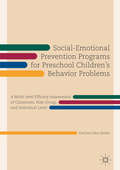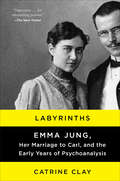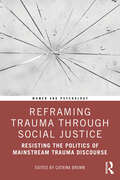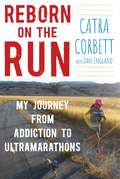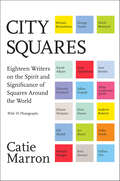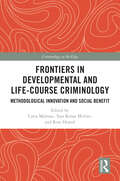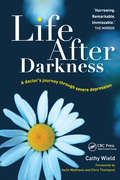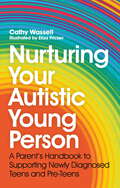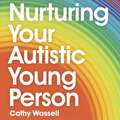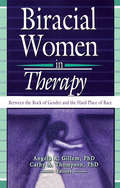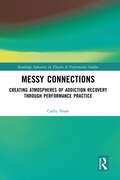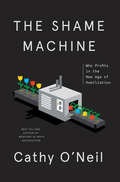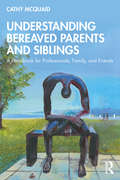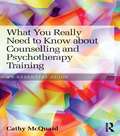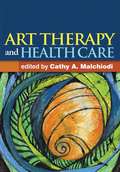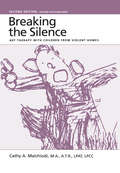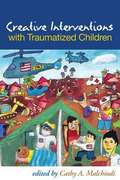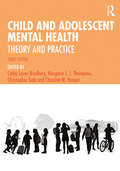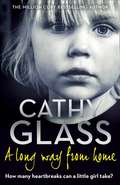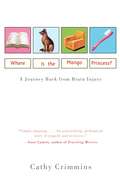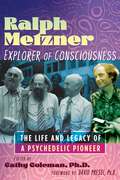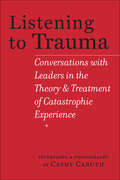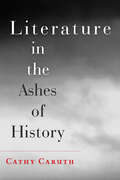- Table View
- List View
Social-Emotional Prevention Programs for Preschool Children's Behavior Problems
by Catrinel Alice ŞtefanThis book is aimed at exploring the relevance of social-emotional competencies for preventing preschool children’s behavior problems. The content provides an overview of how evidence from fundamental research on social-emotional competencies can be translated in applied research for developing prevention programs. The Social-Emotional Prevention program framework is presented as a multi-focused (child, teacher, parent), hybrid approach for both high risk and non-risk preschoolers. The book offers a systematic and in depth evaluation of SEP efficacy including classroom, risk group, and individual level effects. Hence, the proposed approach employs different research designs and statistical methods to explore how behavioral changes occur as a result of children’s participation to the intervention. Each study’s findings are discussed in terms of corresponding implications for practice in schools, but also from a broader perspective including implications for policy makers in the field of early education.
Labyrinths: Emma Jung, Her Marriage to Carl, and the Early Years of Psychoanalysis
by Catrine ClayA sensational, eye-opening account of Emma Jung’s complex marriage to Carl Gustav Jung and the hitherto unknown role she played in the early years of the psychoanalytic movement.Clever and ambitious, Emma Jung yearned to study the natural sciences at the University of Zurich. But the strict rules of proper Swiss society at the beginning of the twentieth century dictated that a woman of Emma’s stature—one of the richest heiresses in Switzerland—travel to Paris to "finish" her education, to prepare for marriage to a suitable man. Engaged to the son of one of her father’s wealthy business colleagues, Emma’s conventional and predictable life was upended when she met Carl Jung. The son of a penniless pastor working as an assistant physician in an insane asylum, Jung dazzled Emma with his intelligence, confidence, and good looks. More important, he offered her freedom from the confines of a traditional haute-bourgeois life. But Emma did not know that Jung’s charisma masked a dark interior—fostered by a strange, isolated childhood and the sexual abuse he’d suffered as a boy—as well as a compulsive philandering that would threaten their marriage. Using letters, family interviews, and rich, never-before-published archival material, Catrine Clay illuminates the Jungs’ unorthodox marriage and explores how it shaped—and was shaped by—the scandalous new movement of psychoanalysis. Most important, Clay reveals how Carl Jung could never have achieved what he did without Emma supporting him through his private torments. The Emma that emerges in the pages of Labyrinths is a strong, brilliant woman, who, with her husband’s encouragement, becomes a successful analyst in her own right.
Ribbons Are for Fearlessness: My Journey from Norway to Portugal beneath the Midnight Sun
by Catrina Davies"Read this book if you have ever loved and lost. . . . It will inspire you. ” --Monique Roffey, author of With the Kisses of His Mouth Fuzzy-haired, neurotic, cello-playing Catrina is devastated when her lover, Jack, leaves her to go surfing on the other side of the world. Trapped in a dead-end job and torn by his departure, Catrina dreams of running away. But how do you run away when you’re flat broke? Luckily, her friend Andrew comes up with a plan: they’ll get an old van, turn it into a camper, and busk their way from Norway to Portugal, via the midnight sun. Andrew is one of her oldest friends and they share many of the same passions and interests, including music. When Andrew is killed in a tragic accident, Catrina decides to go it alone, encountering one disaster after another. She sleeps in her van, gets lost, and struggles to find the confidence to play her cello in front of her growing audience, but meets complete strangers who offer her advice, encouragement, and support along the way. Her experiences on the road gradually teach her the real meaning of love, courage, and above all else, the importance of following her dreams. This is an unforgettable story of a journey like no other--a deeply emotional and inspirational debut by a unique storyteller.
Reframing Trauma Through Social Justice: Resisting the Politics of Mainstream Trauma Discourse (Women and Psychology)
by Catrina BrownThis cross-disciplinary volume examines and reframes trauma as a social and political issue in the context of wider society, critiquing the widely accepted pathologizing of trauma and violence in current discourse.Rooted in critical social theory, this insightful text reinvokes the critiques and analysis of the women’s movement and the "personal is political" framing of trauma to unpack the mainstreaming of trauma discourse which has emerged today. Accomplished contributors address the social construction of femininity and masculinity in relation to trauma and violence, and advocate for a broader framing of trauma away from the constrained focus on pathologizing and diagnosing trauma, individual psychologizing and therapy. Instead, the book offers a fresh and compelling look at how discursive resistance, alternative feminist and narrative approaches to emotional distress and the mental health effects of violence can be developed alongside community-based, preventive, political and policy-based actions to create effective shifts in discourse, practice, policy and programming.This is fascinating reading for upper-level undergraduate and postgraduate students, researchers and academics in a broad range of fields of study, including psychology, social work, gender and women’s studies and sociology, as well as for professionals, including policy makers, clinical psychologists and social workers.
Reborn on the Run: My Journey from Addiction to Ultramarathons
by Catra CorbettAside from her rock star looks, Catra Corbett is a standout in the running world on her accomplishments alone. Catra is the first American woman to run over one hundred miles or more on more than one hundred occasions and the first to run one hundred and two hundredmiles in the Ohlone Wilderness, and she holds the fastest known double time for the 425-miles long John Muir Trail, completing it in twelve days, four hours, and fifty-seven minutes. And, unbelievably, she's also a former meth addict. After two years of addiction, Catra is busted while selling, and a night in jail is enough to set her straight. She gives up drugs and moves back home with her mother, abandoning her friends, her boyfriend, and the lifestyle that she came to depend on. Her only clean friend pushes her to train for a 10K with him, and surprisingly, she likes it?and decides to run her first marathon after that. In Reborn on the Run, the reader keeps pace with Catra as she runs through difficult terrain and extreme weather, is stalked by animals in the wilderness, and nearly dies on a training run but continues on, smashing running records and becoming one of the world?s best ultrarunners. Along the way she attempts suicide, loses loved ones, falls in love, has her heartbroken, meets lifelong friends including her running partner and dachshund TruMan, and finally faces the past that led to her addiction.
City Squares: Eighteen Writers on the Spirit and Significance of Squares Around the World
by Catie MarronIn this important collection, eighteen renowned writers, including David Remnick, Zadie Smith, Rebecca Skloot, Rory Stewart, and Adam Gopnik evoke the spirit and history of some of the world’s most recognized and significant city squares, accompanied by illustrations from equally distinguished photographers.Over half of the world’s citizens now live in cities, and this number is rapidly growing. At the heart of these municipalities is the square—the defining urban public space since the dawn of democracy in Ancient Greece. Each square stands for a larger theme in history: cultural, geopolitical, anthropological, or architectural, and each of the eighteen luminary writers has contributed his or her own innate talent, prodigious research, and local knowledge.Divided into three parts: Culture, Geopolitics, History, headlined by Michael Kimmelman, David Remnick, and George Packer, this significant anthology shows the city square in new light. Jehane Noujaim, award-winning filmmaker, takes the reader through her return to Tahrir Square during the 2011 protest; Rory Stewart, diplomat and author, chronicles a square in Kabul which has come and gone several times over five centuries; Ari Shavit describes the dramatic changes of central Tel Aviv’s Rabin Square; Rick Stengel, editor, author, and journalist, recounts the power of Mandela’s choice of the Grand Parade, Cape Town, a huge market square to speak to the world right after his release from twenty-seven years in prison; while award-winning journalist Gillian Tett explores the concept of the virtual square in the age of social media.This collection is an important lesson in history, a portrait of the world we live in today, as well as an exercise in thinking about the future. Evocative and compelling, City Squares will change the way you walk through a city.Contributors include:David Adjaye on Jemma e-Fnna, Marrakech • Anne Applebaum on Red Square, Moscow and Grand Market Square, Krakow • Chrystia Freeland on Euromaiden, Kiev • Adam Gopnik on Place des Vosges, Paris • Alma Guillermoprieto on Zocalo, Mexico City • Jehane Noujaim on Tahrir Square, Cairo • Evan Osnos on Tiananmen Square, Beijing • Andrew Roberts on Residential Squares, London • Elif Shafak on Taksim Square, Istanbul • Rebecca Skloot on American Town Squares • Ari Shavit on Rabin Square, Tel Aviv • Zadie Smith on the grand piazzas of Rome and Venice • Richard Stengel on Market Square, Grand Parade, Cape Town • Rory Stewart on Murad Khane, Kabul • Plus contributions by Gillian Tett, George Packer, David Remnick, and Michael Kimmelman; illustrations and photographs from renowned photographers, including: Thomas Struth, Philip Lorca di Corcia, and Josef Koudelka
Frontiers in Developmental and Life-Course Criminology: Methodological Innovation and Social Benefit (Criminology at the Edge)
by Catia Malvaso, Tara Renae McGee, and Ross HomelFrontiers in Developmental and Life-Course Criminology advances the field of developmental and life-course criminology (DLC) by highlighting some recent methodological innovations, and exploring the ways in which DLC criminologists are helping to bridge the gap between science and service by their engagement with policymakers and government and non-government agencies. The book is united by three related themes: the use of new data sources including government administrative data systems, the development of intervention and prevention strategies grounded in DLC research, and resilience, prosocial behaviour, and strengths-based approaches. This book opens up new possibilities for the future of DLC research, orienting the DLC field as one that prioritises the achievement of better outcomes for individuals and society.
Life After Darkness: A Doctor’s Journey Through Severe Depression
by Cathy WieldLife After Darkness is the remarkable and moving story of a doctor and mother of four who endured seven years of severe depression. Self-harm, attempted suicides and admissions to psychiatric units culminated in her resorting to brain surgery as a final attempt to escape her illness. The story of Cathy Wield covers the horrors of time spent in archaic institutions and the loss of any hope, to a full recovery following surgery. Today she has returned to her career and rediscovered the joys of life and her family. This story is one of hope from an often hidden and stigmatized disease.
Nurturing Your Autistic Young Person: A Parent’s Handbook to Supporting Newly Diagnosed Teens and Pre-Teens
by Cathy WassellAs the parent of a child recognised as autistic as a pre-teen or teen, it can often feel difficult to find the answers you need. Children who make it to late primary/early secondary age before being picked up by the system tend to present with traits that are harder to spot, meaning it can be harder to engage professionals in the diagnostic process and gather the necessary support.Cathy Wassell, CEO of Autistic Girls Network, has tailored this handbook to support parents with older children or teenagers who are at the identification stage, walking them through the basics in an engaging and accessible manner. She addresses key challenges for this age group, including co-occurring conditions, puberty, and safeguarding, as well as looking to the future, advising on schooling options, and beyond.Designed to help parents become fully informed and ensure a nurturing and positive environment for our autistic young people, this is a guide with a focus on difference - not deficit.
Nurturing Your Autistic Young Person: A Parent’s Handbook to Supporting Newly Diagnosed Teens and Pre-Teens
by Cathy WassellAs the parent of a child recognised as autistic as a pre-teen or teen, it can often feel difficult to find the answers you need. Children who make it to late primary/early secondary age before being picked up by the system tend to present with traits that are harder to spot, meaning it can be harder to engage professionals in the diagnostic process and gather the necessary support.Cathy Wassell, CEO of Autistic Girls Network, has tailored this handbook to support parents with older children or teenagers who are at the identification stage, walking them through the basics in an engaging and accessible manner. She addresses key challenges for this age group, including co-occurring conditions, puberty, and safeguarding, as well as looking to the future, advising on schooling options, and beyond.Designed to help parents become fully informed and ensure a nurturing and positive environment for our autistic young people, this is a guide with a focus on difference - not deficit.
Biracial Women in Therapy: Between the Rock of Gender and the Hard Place of Race
by Cathy Thompson Angela R GillemGet a unique perspective on the female biracial experience! Biracial Women in Therapy: Between the Rock of Gender and the Hard Place of Race examines how physical appearance, cultural knowledge, and cultural stereotypes affect the experience of mixed-race women in belonging to, and being accepted within, their cultures. This unique book combines empirical research, theoretical papers, and first-person narrative to address issues relevant to providing therapy to biracial women and girls, helping therapists and counselors develop a treatment framework based on sociocultural factors. Researchers, practitioners, and academics provide insight into the biracial reality, taking multiple aspects of clients' lives into account rather than looking for simple hierarchies of well-being based on race. Biracial Women in Therapy is a building block for mental health practitioners in the construction of theory and practice in working with biracial females. The book examines how a biracial women's racial/ethnic identity intersects with her gender and sexual identity to affect her sense of belonging and acceptance, addressing issues of appearance, social class, disability, power and guilt, and dating and marriage. Topics addressed in the book include: the complexities of multiple minority status how ethnic differences affect biracial adolescents issues encountered by biracial women from a sociohistorical context biracial women's attitudes toward counseling stereotypes of marginalization and identity confusion a multicultural feminist approach to counseling and a first-person narrative of one author's racial and sexual identity development Biracial Women in Therapy: Between the Rock of Gender and the Hard Place of Race is a one-of-a-kind resource for counselors, therapists, researchers, and academics seeking insight into unique issues of mixed-race women.
Messy Connections: Creating Atmospheres of Addiction Recovery Through Performance Practice (ISSN)
by Cathy SloanThis book examines performance practices that involve people in recovery from addiction, theorising such practices as recovery-engaged.Focusing on examples of practice from a growing movement of UK-based recovery arts practitioners and performers, it highlights a unique approach to performance that infuses an understanding of lived experiences of addiction and recovery with creative practice. It offers a philosophy of being in recovery that understands lived experience, and performance practice, as a dynamic system of interrelations with the human and nonhuman elements that make up the societal settings in which recovery communities struggle to exist. It thereby frames the process of recovery, and recovery-engaged performance, as an affective ecology – a system of messy connections. Building upon ideas from posthumanist research on addiction, cultural theory on identity and new materialist interpretations of performance practice, it considers how such contemporary theory might offer additional ways of thinking and doing arts practice with people affected by addiction. The discussion highlights the distinct aesthetics, ethics and politics of this area of performance practice.This study will be of great interest to students and scholars in Applied Theatre and Critical Arts and Mental Health studies.
The Shame Machine: Who Profits in the New Age of Humiliation
by Cathy O'NeilA clear-eyed warning about the increasingly destructive influence of America&’s &“shame industrial complex&” in the age of social media and hyperpartisan politics—from the New York Times bestselling author of Weapons of Math Destruction&“O&’Neil reminds us that we must resist the urge to judge, belittle, and oversimplify, and instead allow always for complexity and lead always with empathy.&”—Dave Eggers, author of The EveryShame is a powerful and sometimes useful tool: When we publicly shame corrupt politicians, abusive celebrities, or predatory corporations, we reinforce values of fairness and justice. But as Cathy O&’Neil argues in this revelatory book, shaming has taken a new and dangerous turn. It is increasingly being weaponized—used as a way to shift responsibility for social problems from institutions to individuals. Shaming children for not being able to afford school lunches or adults for not being able to find work lets us off the hook as a society. After all, why pay higher taxes to fund programs for people who are fundamentally unworthy? O&’Neil explores the machinery behind all this shame, showing how governments, corporations, and the healthcare system capitalize on it. There are damning stories of rehab clinics, reentry programs, drug and diet companies, and social media platforms—all of which profit from &“punching down&” on the vulnerable. Woven throughout The Shame Machine is the story of O&’Neil&’s own struggle with body image and her recent weight-loss surgery, which awakened her to the systematic shaming of fat people seeking medical care.With clarity and nuance, O&’Neil dissects the relationship between shame and power. Whom does the system serve? Is it counter-productive to call out racists, misogynists, and vaccine skeptics? If so, when should someone be &“canceled&”? How do current incentive structures perpetuate the shaming cycle? And, most important, how can we all fight back?
Understanding Bereaved Parents and Siblings: A Handbook for Professionals, Family and Friends
by Cathy McQuaidUnderstanding Bereaved Parents and Siblings is based on lived experiences and provides insight, ideas, and inspiration on how to support the bereaved, how to talk to them about their experience, and how to help people manage their own shock or grief. Part I of the book contains ten stories from parents and six from siblings sharing their experiences. Each narrator discusses their relationship with the person who died; what led up to the death; the impact of the loss on the speaker; as well as what helped and what hindered them in their grief. Part II is aimed at professionals and draws on various topics such as grief and bereavement models, transgenerational loss, resilience, protection, and creative ways of working with grief. The book will be an essential read for the bereaved and the professionals, family, and friends who are supporting them.
What You Really Need to Know about Counselling and Psychotherapy Training: An essential guide
by Cathy McQuaidBecoming a counsellor or psychotherapist is a transformative and life-changing experience. Some trainees manage this process well, while others struggle to come to terms with the personal impact of their training. In What You Really Need to Know about Counselling and Psychotherapy Training, Cathy McQuaid provides an in-depth but accessible guide to the processes of understanding individual motivations for wanting to undertake training and choosing the most appropriate course. Backed by extensive research, the book explains the training process from beginning to end, covering topics including: entry requirements, course curriculum and terms and conditions of training; the training relationship and group process; the challenges of training; the outcomes of counselling and psychotherapy training. McQuaid leads the reader through the process of choosing a course, working with the course leader and with a group of peers and considering potential employment prospects upon completion. Prompting the reader to consider their own personal, professional and educational needs within the framework of training, this is essential reading for anyone thinking of training as a counsellor or psychotherapist and for trainers and training course providers.
Art Therapy and Health Care
by Cathy MalchiodiDemonstrating the benefits of creative expression for patients living with acute or chronic illness, this volume provides a complete, practical introduction to medical art therapy. It presents evidence-based strategies for helping people of all ages from young children to older adults cope with physical and cognitive symptoms, reduce stress, and improve their quality of life. The book includes detailed case material and 110 illustrations. It describes ways to work with individuals and groups with specific health conditions and challenges, as well as their family members. Contributors are experienced art therapists who combine essential knowledge with in-depth clinical guidance.
Breaking the Silence: Art Therapy With Children From Violent Homes
by Cathy MalchiodiFirst published in 1997. Routledge is an imprint of Taylor & Francis, an informa company.
Creative Interventions with Traumatized Children
by Cathy MalchiodiRich with case material and artwork samples, this volume demonstrates a range of creative approaches for facilitating children's emotional reparation and recovery from trauma. Contributors include experienced practitioners of play, art, music, movement and drama therapies, bibliotherapy, and integrative therapies, who describe step-by-step strategies for working with individual children, families, and groups. The case-based format makes the book especially practical and user-friendly. Specific types of stressful experiences addressed include parental loss, child abuse, accidents, family violence, bullying, and mass trauma. Broader approaches to promoting resilience and preventing posttraumatic problems in children at risk are also presented.
Child and Adolescent Mental Health: Theory and Practice
by Cathy Laver-Bradbury, Margaret J.J. Thompson, Christopher Gale and Christine M. HooperThis textbook provides an overview of child and adolescent mental health. The text covers all core aspects on the subject, from the importance of knowing why mental health in children is important, to how to assess, formulate and treat a variety of presentations seen in children and young people. Beginning with an overview of conditions and the background to emotional and behavioural problems, the book examines the different models and tools used to assess and treat children and young people and provides an outline of the practitioners working to help this population. Chapters consider the many diverse identities and groups within the population, addressing specific problems encountered in children, young people and their families from different cultural backgrounds. This revised edition addresses issues of current public debate such as gender identity and the role of social media in children's and young people’s development and behaviour. Featuring authors from a variety of clinical and research backgrounds, this fully revised third edition is an important resource for all professionals working with children, young people and their families, including student and practitioner psychiatrists, clinical psychologists, mental health nurses and social care specialists.
A Long Way from Home
by Cathy GlassThe true story of 2 year-old Anna, abandoned by her natural parents, left alone in a neglected orphanage. Elaine and Ian had travelled half way round the world to adopt little Anna. She couldn’t have been more wanted, loved and cherished. So why was she now in foster care and living with me? It didn’t make sense. Until I learned what had happened. … Dressed only in nappies and ragged T-shirts the children were incarcerated in their cots. Their large eyes stared out blankly from emaciated faces. Some were obviously disabled, others not, but all were badly undernourished. Flies circled around the broken ceiling fans and buzzed against the grids covering the windows. The only toys were a few balls and a handful of building bricks, but no child played with them. The silence was deafening and unnatural. Not one of the thirty or so infants cried, let alone spoke.
Cut: The True Story of an Abandoned, Abused Little Girl Who Was Desperate to Be Part of a Family
by Cathy GlassDawn was the first girl Cathy Glass ever fostered. A sweet and seemingly well balanced girl, Dawn's outward appearance masked a traumatic childhood so awful, that even she could not remember it. During the first night, Cathy awoke to see Dawn looming above Cathy's baby's cot, her eyes staring and blank. She sleepwalks--which Cathy learns is often a manifestation in disturbed children. It becomes a regular and frightening occurrence, and Cathy is horrified to find Dawn lighting a match whilst mumbling "It's not my fault" in her sleep one night. Cathy discovers Dawn is playing truant from school, and struggling to make friends. More worryingly she finds her room empty one night, and her pillow covered in blood. Dawn has been self-harming in order to release the pain of her past. When Dawn attempts suicide, Cathy realises that she needs more help than she can give. Dawn's mother eventually confides in her that Dawn was sent away to relatives in Ireland between the ages of 5 and 9, and came back very disturbed. She also sheds light on the reason for Dawn's fascination with matches and Cathy's baby. *SPOILER ALERT*SPOILER INFO FOLLOWS* Eventually Dawn is placed in a psychiatric home for children, and five years later she gets in touch with Cathy. She has been reconciled with her mother and is now training to become a teacher.
Where Is the Mango Princess? A Journey Back from Brain Injury: A Journey Back From Brain Injury
by Cathy CrimminsHumorist Cathy Crimmins has written a deeply personal, wrenching, and often hilarious account of the effects of traumatic brain injury, not only on the victim, in this case her husband, but on the family.When her husband Alan is injured in a speedboat accident, Cathy Crimmins reluctantly assumes the role of caregiver and learns to cope with the person he has become. No longer the man who loved obscure Japanese cinema and wry humor, Crimmins' husband has emerged from the accident a childlike and unpredictable replica of his former self with a short attention span and a penchant for inane cartoons. Where Is the Mango Princess? is a breathtaking account that explores the very nature of personality--and the complexities of the heart.
Ralph Metzner, Explorer of Consciousness: The Life and Legacy of a Psychedelic Pioneer
by Cathy Coleman• Includes contributions from Rick Doblin, Charles S. Grob, Stan Grof, Stanley Krippner, Dennis McKenna, the late Christian Rätsch, Richard Strozzi-Heckler, Claudia Mueller-Ebeling, Dorothy Fadiman, Luis Eduardo Luna, and others• Explores Ralph&’s childhood, his time at Harvard with Timothy Leary and Richard Alpert (Ram Dass), his work with Agni Yoga and transpersonal psychology, his development of ecopsychology, and his in-depth psychedelic researchRenowned as a pioneering psychologist, psychedelic elder, alchemical explorer, and shamanic teacher, the late Ralph Metzner (1936–2019) contributed profoundly to consciousness research, transpersonal psychology, and contemporary psychedelic studies across his more than 50-year career.Celebrating the life and legacy of Ralph Metzner, this book explores how Ralph touched the lives of those around him in extraordinary and remarkable ways, recasting people&’s worldviews and inspiring the flowering of creativity, personal growth, and spiritual transformation. There are recollections from the pivotal years of the Sixties, when Ralph conducted research with Timothy Leary and Richard Alpert (Ram Dass). Other contributors describe Ralph&’s involvement in the School of Actualism in the 1970s and the profound impact that Agni Yoga had on Ralph&’s explorations of consciousness and his healing therapies. We also learn about Ralph&’s development of Green Psychology, or ecopsychology, his mystical work exploring prenatal realms of consciousness and channeling, and his healing and transformative &“Vision Circles.&” Academic colleagues and a who&’s who of fellow psychedelic researchers share stories from their work with Ralph, illuminating his depth of knowledge and broad impact. This book paints a complete portrait of Ralph Metzner in his well-known roles as therapist and psychedelic pioneer and as an intrepid explorer of consciousness until the very end of his life.
Listening to Trauma: Conversations with Leaders in the Theory and Treatment of Catastrophic Experience
by Cathy CaruthInterviews and intimate photographic portraits of witnesses to the collective and cultural significance of trauma.This new collection from Cathy Caruth features interviews with a diverse group of leaders in the theorization of, and response to, traumatic experience in the twentieth and twenty-first centuries. Crossing the boundaries of discipline and profession, Caruth’s subjects include literary theorists and critics, psychoanalysts, psychiatrists, psychologists, political activists, filmmakers, public intellectuals, institutional leaders, and researchers. Exploring the intertwining of the intellectual and personal dimensions of experience, each interview is accompanied by Caruth's intimate photographic portrait of its subject. Caruth chose her subjects because of their impact on her thinking as well as their significant role as witnesses to the collective and cultural significance of trauma. The individuals profiled here are innovators in the theory of trauma (Part I), in the clinical, activist, or testimonial interventions in trauma (Part II), or in the creation or modification of institutions that provide therapeutic, artistic, or legal responses to traumatic events (Part III). Two of the interviews first appeared in Caruth's landmark 1995 work, Trauma: Explorations in Memory. The rest were conducted between 2011 and 2013 after the field of trauma studies expanded significantly. Representing both the foundation of trauma research and cutting-edge approaches to the topic, this collection will be useful to practitioners with an interest in post-traumatic stress disorder as well as scholars exploring the multiple dimensions of profound human experience.A portion of the proceeds from sales of this book will go to the Grady Nia Project for abused, suicidal, and low-income African American women.
Literature in the Ashes of History
by Cathy CaruthWhat does it mean for history to disappear?Outstanding Academic Title, ChoiceCathy Caruth juxtaposes the writings of psychoanalysts, literary and political theorists, and literary authors who write in a century faced by a new kind of history, one that is made up of events that seem to undo, rather than produce, their own remembrance. At the heart of each chapter is the enigma of a history that, in its very unfolding, seems to be slipping away before our grasp. What does it mean for history to disappear? And what does it mean to speak of a history that disappears? These questions, Caruth suggests, lie at the center of the psychoanalytic texts that frame this book, as well as the haunting stories and theoretical arguments that resonate with each other in profound and surprising ways. In the writings of Honoré de Balzac, Hannah Arendt, Ariel Dorfman, Wilhelm Jensen, Sigmund Freud, and Jacques Derrida, we encounter, across different stakes and different languages, a variety of narratives that bear witness not simply to the past but also to the pasts we have not known and that repeatedly return us to a future that remains beyond imagination.These stories of trauma cannot be limited to the catastrophes they name, and the theory of catastrophic history may ultimately be written in a language that already lingers in a time that comes to us from the other side of the disaster.
